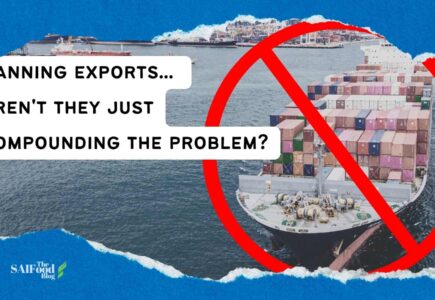Preventing trade in food products creates more harm than good
Bans on exported food products seem to be announced on a near-monthly basis. In December 2021, Argentina announced it would limit the amount of wheat and corn being exported. In April, Indonesia’s government announced something similar, banning the export of palm oil. Despite being the world’s largest exporter of palm oil, the ban was implemented to secure local demands and lower the domestic price. Three weeks later, the Indonesian government announced that it would end the export ban. After facing extreme heat for an extended period in May, the Indian government announced it was banning the export of wheat. These recent bans have not all been crop-related. At the end of May, Malaysia’s government announced that it was implementing a ban on the export of chicken, due to domestic shortages.
At first glance, the concept of banning exports can seem like a logical one, specifically when the domestic marketing imposing the ban is facing shortages or extreme local prices. But on examination of the economic impacts of such decisions, these bans can have the opposite effects as to what was initially intended. With countries presently banning the export of various commodities, such decisions are similar to decisions made 15 years ago during the food crisis of 2007-2008. In October 2007, India announced that it would ban the export of rice as a way of ensuring that enough rice was domestically available. The effect of India’s announcement skyrocketed Thailand’s export price of rice. Between May 2007 and May 2008, the international price of rice went from US$317/t to US$902/t, an increase of 184%. The result of India’s action to ban rice exports, protecting their market, shifted the problem of supplying the global demand for rice onto other rice exporting countries. While global trade is essential, when shocks hit the system, simply imposing a ban can cause a larger ripple to the larger global trade.
The implications of India’s export ban on rice, resulted in the global price of rice increasing more than it would otherwise have done. The higher price had to be paid by all rice importing countries, making all rice importing countries worse off. Currently, India and Argentina’s bans on wheat exports have contributed to the rise in the price of wheat, which has risen from US$380/t in November 2021 to US$495/t in April 2022, a 30% increase. This higher price also hurts the World Food Programme that purchases wheat for redistribution to food-insecure countries, particularly countries in northern Africa.
Political rationale frequently dictates that export bans be enacted to protect domestic supply and ensure food stocks are adequate to feed the population. Economic evidence establishes that export bans raise commodities prices higher than would have been the case in the absence of the ban. With commodities like rice and wheat being two of the three global staples, export bans negatively affect billions of consumers in other countries.
As supply chain challenges continue to rise, which contribute to greater uncertainty about their ability to globally function in the face of rising fuel prices, transportation costs and inflation, export bans may be something the world sees more of in the coming months. This would be a very worrying trend. Food prices have soared for many products in virtually all parts of the world. Commodity export bans will simply push these high prices even higher. Low income and fixed income households will experience the greatest impacts, as the price of some products may be pushed beyond their means, with one result being a nutritionally reduced diet. The sad reality is that all of this is beyond the means of control for the average consumer and these poor policy decisions simply result in higher food prices for all of us. While it is easy to look back at how export bans have had greater impacts on us all, maybe it is time the World Trade Organization consider a new policy or system to reduce bans when prices surge and supplies dip. Otherwise, we are just continuing on this cycle in which the less fortunate continue to lose.


